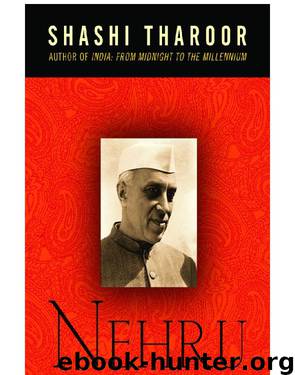Nehru by Shashi Tharoor

Author:Shashi Tharoor
Language: eng
Format: epub, mobi
Publisher: Skyhorse Publishing, Inc.
8
“Commanding Heights”:
1947–1957
One man did not join the celebrations that midnight. Mahatma Gandhi stayed in Calcutta, fasting, striving to keep the peace in a city that just a year earlier had been ravaged by killing. He saw no cause for celebration. Instead of the cheers of rejoicing, he heard the cries of the women ripped open in the internecine frenzy; instead of the slogans of freedom, he heard the shouts of the crazed assaulters firing their weapons at helpless refugees, and the silence of trains arriving full of corpses massacred on their journey; instead of the dawn of Jawaharlal’s promise, he saw only the long dark night of horror that was breaking his country in two. In his own Independence Day message to the nation Jawaharlal could not help thinking of the Mahatma:
On this day, our first thoughts go to the architect of freedom, the Father of our Nation who, embodying the old spirit of India, held aloft the torch…. We have often been unworthy followers of his, and we have strayed from his message, but not only we, but the succeeding generations, will remember his message and bear the imprint in their hearts.
It was a repudiation as well as a tribute: the Mahatma was now gently relegated to the “old spirit of India” from whom the custodians of the new had “strayed.” In his crushing disillusionment with his own people (of all religions), the Mahatma announced that he would spend the rest of his years in Pakistan, a prospect that made the leaders of the League collectively choke. But he never got there: on January 30, 1948, a Hindu extremist angered by Gandhi’s sympathy for Muslims shot him dead after a prayer meeting. Mahatma Gandhi died with the name of God on his lips.
The grieving nation found grim solace only in the fact that his assassin had been a Hindu, not a Muslim; the retaliatory rage that a Muslim killer would have provoked against his coreligionists would have made the partition riots look like a school-yard brawl. “The light has gone out of our lives,” a brokenhearted Jawaharlal declared in a moving broadcast to the nation, “and there is darkness everywhere. . . . The light has gone out, I said, and yet I was wrong…. For that light represented something more than the immediate present; it represented the living truth, the eternal truths, reminding us of the right path, drawing us from error, taking this ancient country to freedom.” Jawaharlal Nehru had lost a father figure; after Motilal’s death he had grown at the feet of the Mahatma, relying on the older man’s wisdom, advice, and patronage. Now, at the age of fifty-eight, he was truly alone.
The first months of independence were anything but easy. Often emotional, Jawaharlal was caught up in the human drama of the times. He was seen weeping at the sight of a victim one day, and erupting in rage at a would-be assailant hours later. Friends thought his physical health would be in danger
Download
This site does not store any files on its server. We only index and link to content provided by other sites. Please contact the content providers to delete copyright contents if any and email us, we'll remove relevant links or contents immediately.
| Central Asia | Southeast Asia |
| China | Hong Kong |
| India | Japan |
| Korea | Pakistan |
| Philippines | Russia |
The Sympathizer by Viet Thanh Nguyen(4390)
The Rape of Nanking by Iris Chang(4213)
World without end by Ken Follett(3477)
Ants Among Elephants by Sujatha Gidla(3467)
Blood and Sand by Alex Von Tunzelmann(3205)
Japanese Design by Patricia J. Graham(3177)
The Queen of Nothing by Holly Black(2599)
City of Djinns: a year in Delhi by William Dalrymple(2555)
Foreign Devils on the Silk Road: The Search for the Lost Treasures of Central Asia by Peter Hopkirk(2464)
India's Ancient Past by R.S. Sharma(2454)
Inglorious Empire by Shashi Tharoor(2441)
Tokyo by Rob Goss(2431)
In Order to Live: A North Korean Girl's Journey to Freedom by Yeonmi Park(2392)
Tokyo Geek's Guide: Manga, Anime, Gaming, Cosplay, Toys, Idols & More - The Ultimate Guide to Japan's Otaku Culture by Simone Gianni(2373)
India's biggest cover-up by Dhar Anuj(2355)
The Great Game: On Secret Service in High Asia by Peter Hopkirk(2349)
Goodbye Madame Butterfly(2253)
Batik by Rudolf Smend(2185)
Living Silence in Burma by Christina Fink(2072)
